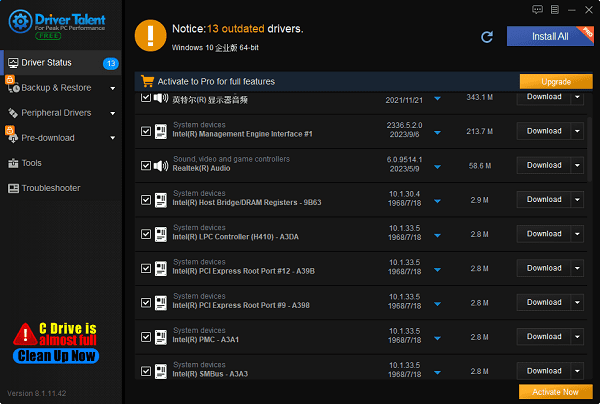Is SSD better than HDD and an introduction to their differences and selection
Apr. 18, 2024 / Updated by Seraphina to News

Solid-state drives (SSDs) have become the mainstream storage choice for modern computers and mobile devices, widely used in personal computers, laptops, servers, data centers, and various other devices to provide faster, more reliable, and efficient storage solutions. Hard disk drives (HDDs) typically offer larger storage capacities and are more cost-effective compared to SSDs.
Contents:
3). Advantages of Solid State Drives
2). Advantages of Hard Disk Drives
3. Differences between Hard Disk Drives and Solid State Drives
4. Choosing Between Hard Disk Drives and Solid State Drives
A solid-state drive (SSD) is a storage device used to store data, employing solid-state memory as the storage medium instead of the rotating disks and moving read/write heads found in traditional hard disk drives. SSDs typically consist of flash memory chips, which offer fast read/write speeds and low latency, making SSDs much faster in data access and higher in performance compared to traditional hard disk drives.
It is a storage device with a capacity of 2TB, utilizing solid-state technology for data storage. This type of SSD offers high-speed data access and transfer rates, suitable for various applications requiring large capacity storage and fast performance.

3). Advantages of Solid State Drives:
(1). Faster read/write speeds:
SSDs typically offer read/write speeds several times faster than hard disk drives, greatly enhancing computer response time and operational efficiency.
(2). Lower power consumption:
SSDs do not require mechanical movement, resulting in lower power consumption, which can extend battery life and reduce energy consumption.
(3). Higher durability:
SSDs do not contain moving parts prone to wear and tear, such as the rotating disks and moving read/write heads in hard disk drives, making them more durable and less susceptible to physical damage.
(4). Lighter and smaller:
SSDs do not require mechanical structures, resulting in smaller volume and lighter weight, making them more suitable for lightweight mobile devices and laptops.
A mechanical hard disk drive (HDD) is a traditional storage device used to store data. It consists of one or more rotating disks (usually made of metal or glass). The operation of hard disk drives is based on mechanical motion, where data read and write operations are achieved by controlling the rotation speed of the disks and the position of the read/write heads. Hard disk drives are typically connected to the motherboard of a computer and communicate with the computer through data transfer interfaces (such as SATA).
2). Advantages of Hard Disk Drives:
(1). Large storage capacity:
Hard disk drives typically offer larger storage capacities than SSDs of equivalent price, suitable for scenarios requiring large capacity storage, such as storing large files, multimedia content, etc.
(2). Lower cost:
Compared to SSDs, hard disk drives are more cost-effective, making them a more attractive choice for users with limited budgets.

(3). Reliability:
Hard disk drives have been in the market for a long time, and their technology is relatively mature, providing higher reliability and stability for long-term data storage.
(4). Wide applicability:
Hard disk drives can be used in various application scenarios, including home, office, servers, etc., with wide-ranging applicability.
(5). Suitable for large data transfer:
Although SSDs have faster read/write speeds, hard disk drives can provide stable performance when transferring large amounts of data at once. For tasks involving large data transfers, hard disk drives remain a suitable choice.
3. Differences between Hard Disk Drives and Solid State Drives:
Hard Disk Drive (HDD) and Solid State Drive (SSD) are two common storage devices that differ in their working principles, performance characteristics, and applicable scenarios.

1). Working principles:
Hard Disk Drive (HDD): Uses mechanical motion of rotating disks and moving read/write heads to read and write data. Data is stored on the magnetic surface of the disks and accessed by moving the read/write heads across the disks.
Solid State Drive (SSD): Does not contain mechanical moving parts, but instead uses flash memory chips to store data. Data is stored electronically on the chips and accessed through a controller.
2). Performance characteristics:
Speed: SSDs typically offer faster speeds than hard disk drives since they do not rely on mechanical motion. SSDs have faster read/write speeds, providing quicker boot times, application loading times, and file transfer speeds.
Durability: SSDs are more durable than hard disk drives as they lack moving parts, making them more resistant to shock and vibration. In contrast, the mechanical components in hard disk drives are susceptible to damage from physical impacts.
Noise: SSDs are silent as they do not have mechanical parts in operation, while hard disk drives generate slight noise during data read/write operations.
3). Applicable scenarios:
Hard Disk Drive (HDD): Suitable for scenarios requiring large capacity storage and not demanding high read/write speeds, such as storing large files, multimedia content, backups, etc.
Solid State Drive (SSD): Suitable for scenarios requiring high read/write speeds and demanding durability and shock resistance, such as installing operating systems and commonly used applications, game loading, data transfer, etc.
4. Choosing Between Hard Disk Drives and Solid State Drives:
Solid-state drives (SSDs) are generally superior to hard disk drives (HDDs). SSDs offer faster read/write speeds, lower access latency, and higher durability, making them superior to hard disk drives in terms of performance and response time. Additionally, SSDs are quieter, more energy-efficient, and more durable since they lack moving parts. However, hard disk drives typically offer higher storage capacities and are more competitively priced. Therefore, the choice between the two types of drives can be considered from several aspects.
1). Performance requirements:
If you require faster boot times, application loading speeds, and file transfer speeds, SSDs are the better choice due to their faster read/write speeds.
If speed requirements are not particularly high but large capacity storage is needed, hard disk drives may be a more cost-effective choice.
2). Durability and reliability:
SSDs are typically more durable than hard disk drives since they lack moving parts, making them more resistant to shock and vibration and less prone to damage.
The mechanical components in hard disk drives are susceptible to physical impacts, making them more prone to damage.
3). Price:
SSDs are generally more expensive than hard disk drives, especially for high-capacity SSDs.
If budget is limited and large capacity storage is needed, hard disk drives may be a more cost-effective choice.
4). Usage scenarios:
If you need storage for installing operating systems and commonly used applications, as well as tasks involving frequent data read/write operations (such as video editing, game loading, etc.), SSDs are more suitable.
If you mainly need storage for storing large files, multimedia content, backups, etc., and high read/write speeds are not critical, hard disk drives may be a more appropriate choice.
5). Capacity requirements:
SSDs typically offer smaller capacities, especially in lower-priced models. If you need large capacity storage and have a limited budget, hard disk drives may be a better choice.

Above is the comparison and selection between solid-state drives and hard disk drives. If you encounter driver-related issues such as network cards, graphics cards, Bluetooth, sound cards, etc., you can use "Driver Talent" for detection and repair. Additionally, Driver Talent supports driver downloads, installations, backups, etc., providing flexible driver management.

See also:
How to install sound card drivers
Steps to clean up a full C drive on the computer
Dota 2 crash troubleshooting guide
No Internet Connection-5 Common Solutions
Is Cyberpunk 2077 still a good game and it's crash troubleshooting guide

|
ExplorerMax |

|
Driver Talent for Network Card | |
| Smart and advanced file explorer tool for Windows platforms | Download & Install Network Drivers without Internet Connection | |||
| 30-day Free Trial | Free Download |








